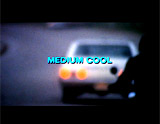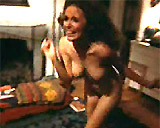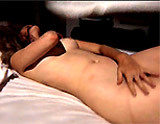
|
Medium Cool (1969)
In Haskell Wexler's debut film (controversially rated
X), an independently-made documentary about the 1968 Chicago Democratic
convention and its major police riots:
- the early foreshadowing scene of a group of journalists
and cameramen discussing their dangerous profession and various
ethical issues: ("I've made films on all kinds of social problems,
and the big bombs were the ones where we went into detail and showed
why something happened. Nobody wants to take the time. They'd rather
see 30 seconds of somebody getting his skull cracked. Turn off
the TV set, and say, 'Wasn't that bad?'"), ("Our position
is one to, to, uh, to record"), ("... the dynamics that
are happening in society. We don't, we don't deal with the static
things. We deal with the things that are happening. We deal with
the violence. We deal with the - who wants to see somebody sitting?
Who wants to see somebody lying down? Who wants to see somebody
talking peace, unless they're talking loud"), ("I think
the cameraman makes the choice himself and he's out there to get
the blood and guts. Oh yes, I believe that"), and ("I've
got a job to do and I'm interested in it, and if this is it, but
the point that I resent very much is the fact that wherever I go,
I'm beat up")
- the experiences of jaded, Chicago-TV freelance cameraman
John Cassellis (Robert Forster) with his sound man Gus (Peter Bonerz),
who worked against the backdrop of the actual 1968 Democratic Convention
in Chicago
- the realistic, documentary footage of the convention's
protests and riots (demonstrators battling police) blended together
with a fictional story - signaled by a crew member's shout: "This
is real, Haskell"
- in a frequently-noted frenzied scene with very brief
full-frontal nudity, John romped and ran nude (as sexual foreplay)
around an apartment with sultry nurse and girlfriend Ruth (Marianna
Hill) - it marked the first mainstream American feature film
to show full male and female nudity
|
Controversial Sequence
|

|

|
- the last scene, in the middle of a real riot and
protest (heard on the soundtrack), (mirroring the car crash at
the start of the film), of John Cassellis accidentally crashing
his car into a tree, killing widowed mother Eileen (Verna Bloom)
from Appalachia (who lost her husband in the Vietnam War, and had
a runaway son named Harold (Harold Blankenship)), his love-interest,
and severely injuring himself; witnesses in a passing car snapped
shots of the gruesome crash
- the closing view of an ubiquitous camera recording
events as the camera zoomed into the blackness of its lens, while
protestors chanted: "The Whole World is Watching!"
|

Journalists in Discussion

Chicago Democratic Convention Protestors


Cameraman John's Car Crash - Witnessed by Passers-By

"The Whole World is Watching"
|






